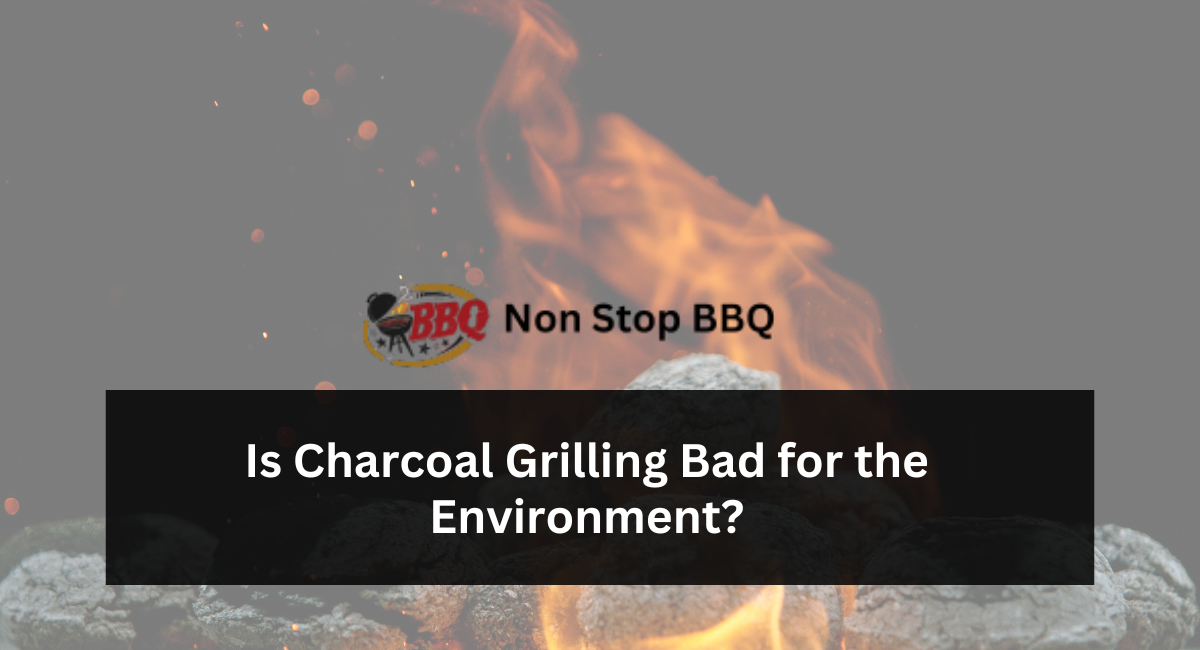Charcoal grilling is a popular way to cook food outdoors, but is it bad for the environment? Charcoal grilling produces smoke and releases carbon dioxide and other pollutants into the air. It also produces ash, which can be harmful to the environment if not disposed of properly.
In this article, we will explore the environmental impacts of charcoal grilling and discuss ways to reduce its environmental impact. We will also look at the benefits of charcoal grilling and how it can be done in a more sustainable way.
The Pros and Cons of Charcoal Grilling: Is it Bad for the Environment?
Charcoal grilling is a popular way to cook food outdoors, but it has its pros and cons. On the one hand, charcoal grilling can provide a unique flavor to food that is not achievable with other cooking methods. On the other hand, charcoal grilling can be bad for the environment due to the smoke and emissions it produces.
The Pros of Charcoal Grilling
One of the main advantages of charcoal grilling is the flavor it can impart to food. Charcoal grilling can give food a smoky flavor that is not achievable with other cooking methods.
Charcoal grilling also requires less time and effort than other methods, as it is easy to light and requires minimal monitoring. Charcoal grills are also relatively inexpensive and easy to find.
The Cons of Charcoal Grilling
One of the main drawbacks of charcoal grilling is the smoke and emissions it produces. Charcoal grilling releases carbon dioxide, carbon monoxide, and other pollutants into the air. These pollutants can contribute to air pollution and can be harmful to human health.
Charcoal grilling also produces ash, which can be difficult to clean up and can be harmful to the environment if not disposed of properly.
Outcome
Charcoal grilling can be a great way to cook food outdoors, but it is important to consider the environmental impact of this cooking method. Charcoal grilling can produce smoke and emissions that can be harmful to the environment and human health.
It is important to take steps to reduce the environmental impact of charcoal grilling, such as using charcoal briquettes made from renewable sources and disposing of ash properly.
How Charcoal Grilling Impacts the Environment and What You Can Do to Reduce Its Impact
Charcoal grilling is a popular way to cook food outdoors, but it can have a negative impact on the environment. Charcoal grilling releases carbon dioxide, carbon monoxide, and other pollutants into the air, which can contribute to air pollution and global warming.
Additionally, charcoal grilling can produce ash and other waste that can be harmful to the environment.
Fortunately, there are steps that can be taken to reduce the environmental impact of charcoal grilling. First, it is important to use the right type of charcoal.
Natural charcoal is a better choice than briquettes, as it is made from renewable sources and produces fewer pollutants. Additionally, it is important to use the right amount of charcoal. Too much charcoal can lead to an increase in air pollution, while too little can lead to an inefficient burn.
It is also important to use the right grilling techniques. Charcoal grills should be preheated before cooking to ensure that the charcoal is burning efficiently.
Additionally, it is important to keep the grill covered when not in use to reduce the amount of smoke and pollutants released into the air.
Finally, it is important to dispose of charcoal properly. Charcoal should be allowed to cool completely before disposing of it in a metal container.
This will help to reduce the amount of ash and other pollutants that are released into the environment.
By following these steps, it is possible to reduce the environmental impact of charcoal grilling. This will help to ensure that charcoal grilling can continue to be enjoyed without harming the environment.
Q&A
Q: Is charcoal grilling bad for the environment?
A: Charcoal grilling can be bad for the environment if not done responsibly. Charcoal grilling produces smoke and air pollution, which can contribute to air quality issues.
Additionally, charcoal grills can produce carbon monoxide, which is a toxic gas.
Q: What are some ways to reduce the environmental impact of charcoal grilling?
A: To reduce the environmental impact of charcoal grilling, use natural charcoal briquettes instead of lighter fluid.
Additionally, use a chimney starter to light the charcoal, which will reduce the amount of smoke produced. Finally, be sure to dispose of the charcoal properly after use.
Q: Are there any alternatives to charcoal grilling?
A: Yes, there are alternatives to charcoal grilling. Electric grills, gas grills, and pellet grills are all viable alternatives that produce less smoke and air pollution than charcoal grills.
Additionally, these alternatives are often more energy-efficient than charcoal grills.
Conclusion
In conclusion, charcoal grilling can be bad for the environment if not done responsibly. Charcoal grills produce smoke and carbon dioxide, both of which can contribute to air pollution.
Additionally, charcoal grills can produce ash and other pollutants that can contaminate soil and water. To reduce the environmental impact of charcoal grilling, it is important to use charcoal briquettes that are made from sustainable sources, such as coconut shells or hardwood, and to dispose of ash and other pollutants properly.

Leave a Reply